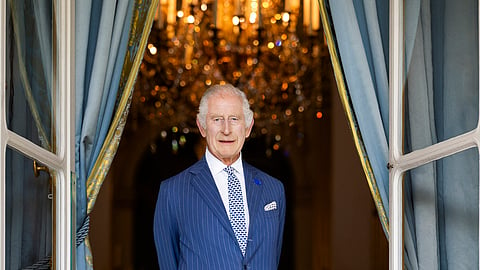

LONDON: 17 months after becoming monarch, King Charles III has been diagnosed with cancer. He learned he had cancer after surgery for an enlarged prostate at the end of January.
The king returned to London on Monday from his Sandringham residence in eastern England, where he received initial treatment. He underwent a corrective procedure for his benign prostate condition during a three-night stay at the private London Clinic.
Buckingham Palace has not specified the type of cancer the 75-year-old king is suffering from but indicated that it was not prostate cancer.
The cancer was detected "early," according to Prime Minister Rishi Sunak, which theoretically improves the chances of recovery.
The king was informed of his diagnosis at the beginning of last week, according to the Daily Mail newspaper, but was still seen attending church at Sandringham with Queen Camilla on Sunday and waving to wellwishers.
The king took the time to inform his close family members, notably his son Harry, with whom relations have been tense for months, before making his illness public "to avoid speculation."
With Charles set to withdraw from public life to undergo treatment, what does this mean for the British monarchy?
What are King Charles III's functions?
Charles is the head of state of the United Kingdom as well as 14 other Commonwealth countries, from Canada to Australia and Jamaica.
His functions are essentially ceremonial and he is not supposed to intervene in political debate. However, he is required to enact British laws, appoint a prime minister and open parliamentary sessions, among other official duties.
He also has diplomatic duties, which Charles, 75, has enthusiastically embraced since his accession to the throne 17 months ago.
He has hosted visiting heads of state, travelled to Germany, France, and Kenya, and delivered a speech at the COP28 climate conference.
William and Camilla take the lead
The British public mostly sees the royal family travelling across the country for hundreds of visits each year to associations, public services, or inaugurations. They also support initiatives for the homeless and encourage reading and nature conservation.
Charles has been particularly active since becoming monarch, and even before as heir to Queen Elizabeth II, as her health faltered in the final years before her death in September 2022.
His absence, while he rested after a prostate operation in January, has brought his wife, Queen Camilla, increasingly into the spotlight.
At 76, Camilla has maintained an active schedule, even in recent days, when the king's cancer had already been diagnosed.
As the heir, William, 41, will find himself at the forefront of royal duties.
However, his widely popular wife Kate is out of action until at least the end of March, after abdominal surgery in mid-January. William had stepped back to stay by Kate's side and take care of their three children. His return is scheduled for Wednesday, with award ceremonies and a charity gala.
According to the British press, he will take over some of his father's responsibilities.
The simultaneous absence of two "royals" highlights the reduction in the number of active members of the monarchy after the withdrawal of the disgraced Prince Andrew. The king's brother attracted damaging headlines over his friendship with the late US sex offender financier Jeffrey Epstein.
Harry, Charles's younger son, is, meanwhile, estranged from the family.
Behind the scenes, Charles continues to manage 'state affairs'
While undergoing treatment, Charles "will continue to take care of state affairs and administrative tasks as usual," Buckingham Palace said.
Prime Minister Rishi Sunak, with whom the monarch speaks once a week, has already said communication with him would continue as usual.
According to the British media, the king continues to receive his famous "red boxes" of official documents every morning and will hold meetings with advisors. He can also hold video conferences, as the queen did during the COVID-19 pandemic.
Royal family biographer Robert Hardman told the BBC that "the day-to-day operation of the monarchy is not going to change," even though the king will stay away from the public to protect his health.
"It doesn't prevent doing things; there's no constitutional concern," he said.
And if the king is no longer able to work?
The monarch can be replaced by two "Counsellors of State" drawn from a list that includes the queen, the heir, and certain family members like his sister Anne or his brother Edward.
The royal family specified to Parliament at the end of 2022 that "only its active members" could "in practice" act as Counsellors of State, effectively excluding Harry and Andrew.